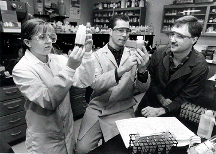| ||||||||||||
University of Delaware Environmental Soil Chemistry Members In The News | ||||||||||||
Cooperative Extension University of Delaware College of Agricultural Sciences | ||||||||||||
Plant and Soil Sciences PH: (302) 831-2532 FAX: (302) 831-0605 | ||||||||||||
 | ||||||||||||
June/July 1996 Volume 4 Issue 6 Research Program Grows In Environmental Soil Chemistry "When you taste a wine, you are not just tasting the fruit, you are tasting the soil. Everything in nature affects the soil." -Robert Mondavi
"As the importance of environmental issues continues to increase, the interest in soil science grows," says Sparks. "We have a world-class program that attracts graduate students, postdocs and visiting professors from all over the United States and abroad." Faculty in soil science generate approximately $600,000 per year in contracts and grants with funds coming from industry and government, including USDA and EPA. Faculty members hold prestigious journal editorships and have published textbooks, chapters in books and numerous journal articles. Two faculty members are fellows of their professional society. The soil chemistry research group, under the direction of Sparks, is one of the largest of its kind with 10-12 students and postdoctoral fellows. State-of-the-art approaches for speciating or determining the form of metals and organics in contaminated soils sp that effective remediation stratiegie can be developed are an emphasis of the soil chemistry group. These researchers are ethnically diverse with European, Asian and North American enrollment and academically diverse with backgrounds in geology, chemistry and engineering. "Students must have a broad academic background to be employable in today's market," Sparks says. "Academic and industrial positions are scarce and very competitive. Employees are hiring graduates who can bridge groups, collaborate and be involved with interdisciplinary research, but still be well-grounded in the fundamentals. "We've been successful in placing our graduates," he notes. "Of the last seven faculty positions available nationally in soil chemistry, three have been filled with UD graduates and post-docs. We have other graduates on faculties in chemistry and earth science departments. Many also have entered the field of industrial research or work at national laboratories." The successful placement of graduates has ensured a steady stream of top-quality applicants. The soil chemistry program accepts three to four new students and postdocs each year. Successful candidates have come from prestigious soil science and chemistry programs in the United States and abroad--including the University of California, Iowa State University, Texas A&M, the Swiss Federal Institute in Zurich and Wageningen University in the Netherlands. The program currently boasts five graduate students who have won competitive fellowships--one a university-wide fellowship, one on a Dupont fellowship and three college fellowships. Awards garnered by students in the soil chemistry program include two national dissertation awards from the Soil Science Society of America. Four graduates have won International Potash and Phosphate Institute fellowships. Others have won the university teaching award, UD's Theodore Wolf doctoral dissertation prize in the physical and life sciences and three regional agronomy graduate student awards. Sparks attributes the success of the students and the program to a first-rate faculty, state-of-the art equipment and ongoing support from grants. "Our students' educational process is enhanced by their collaboration with our faculty as well as with visiting scientists and researchers at national laboratories and in industry," Sparks says. "In addition, having access to state-of-the-art equipment has placed our students at distinct advantage. Without such equipment, it is difficult to conduct cutting-edge research and to ensure that students are well-trained and competitive in the job market. We are grateful to the Unidel Foundation for providing support for modern equipment including a recently acquired atomic force microscope."
| ||||||||||||
 | ||||||
Home | Members | News | Links | Research | Meetings | Awards | Alumni | Publications | Search | |
| |


